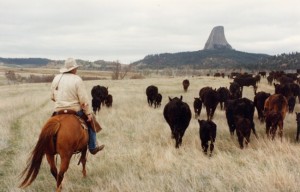Collective Bargaining, Ranchers, Farmers, Model Managers
 Farmers don’t abuse, neglect, or minimize animals under their care because problems will show up. Even slaveowners centuries ago understood this. No, people aren’t animals, but the same dynamics about caring apply. Families know this instinctively.
Farmers don’t abuse, neglect, or minimize animals under their care because problems will show up. Even slaveowners centuries ago understood this. No, people aren’t animals, but the same dynamics about caring apply. Families know this instinctively.
Sure, there will always be miscreant farmers who get sadistically drunk, or do ego dumps on their animals, but they are rare exceptions, and like drunk speeders, soon take themselves out of the Darwinian gene pool. The self-defeating nature of these “managers from hell” means that they will surely fail.
So do cows need collective bargaining? No, because farmers and ranchers are looking after them. Mutual self-interest has worked this way since pre-history. It’s the Golden Rule writ large: I’ll be good to you so that you’ll be good to me. I’ll be responsible about your “necessities of life” and well-being because it’s in my own best interests to be so.
 Robber barons are gone and exploitive employers soon find that their best workers have found jobs elsewhere. Unions served an important function in the early days when profit-obsessed owners cared little about the welfare of their employees. Aren’t good farmers and ranchers still the norm, and don’t they police any cruel ones? Yes, subsidies often prop up the weakest, who should be allowed to fail.
Robber barons are gone and exploitive employers soon find that their best workers have found jobs elsewhere. Unions served an important function in the early days when profit-obsessed owners cared little about the welfare of their employees. Aren’t good farmers and ranchers still the norm, and don’t they police any cruel ones? Yes, subsidies often prop up the weakest, who should be allowed to fail.
Successful employers today, however, know how to cultivate a workforce that has sufficiently high morale, good wages and working hours, as well as training. Health and safety is not overlooked. Why? Ask any farmer or rancher.
 Government leaders and middle managers look out for the employees under them, at least they’re supposed to if a successful operation is desired. College presidents, for example, are downwardly accountable in this way, and see that department heads are the same. To be “bad” is to risk an unhappy, malcontent faculty who, quite frankly, won’t produce.
Government leaders and middle managers look out for the employees under them, at least they’re supposed to if a successful operation is desired. College presidents, for example, are downwardly accountable in this way, and see that department heads are the same. To be “bad” is to risk an unhappy, malcontent faculty who, quite frankly, won’t produce.
Aren’t other corporate managers the same? And aren’t the voters in charge of choosing their own economic leaders, just as shoppers also “vote” at the cash register for the consumer world they want to see more of?
 Farmers don’t abuse, neglect, or minimize animals under their care because problems will show up. Even slaveowners centuries ago understood this. No, people aren’t animals, but the same dynamics about caring apply. Families know this instinctively.
Farmers don’t abuse, neglect, or minimize animals under their care because problems will show up. Even slaveowners centuries ago understood this. No, people aren’t animals, but the same dynamics about caring apply. Families know this instinctively. Robber barons are gone and exploitive employers soon find that their best workers have found jobs elsewhere. Unions served an important function in the early days when profit-obsessed owners cared little about the welfare of their employees. Aren’t good farmers and ranchers still the norm, and don’t they police any cruel ones? Yes, subsidies often prop up the weakest, who should be allowed to fail.
Robber barons are gone and exploitive employers soon find that their best workers have found jobs elsewhere. Unions served an important function in the early days when profit-obsessed owners cared little about the welfare of their employees. Aren’t good farmers and ranchers still the norm, and don’t they police any cruel ones? Yes, subsidies often prop up the weakest, who should be allowed to fail. Government leaders and middle managers look out for the employees under them, at least they’re supposed to if a successful operation is desired. College presidents, for example, are downwardly accountable in this way, and see that department heads are the same. To be “bad” is to risk an unhappy, malcontent faculty who, quite frankly, won’t produce.
Government leaders and middle managers look out for the employees under them, at least they’re supposed to if a successful operation is desired. College presidents, for example, are downwardly accountable in this way, and see that department heads are the same. To be “bad” is to risk an unhappy, malcontent faculty who, quite frankly, won’t produce.